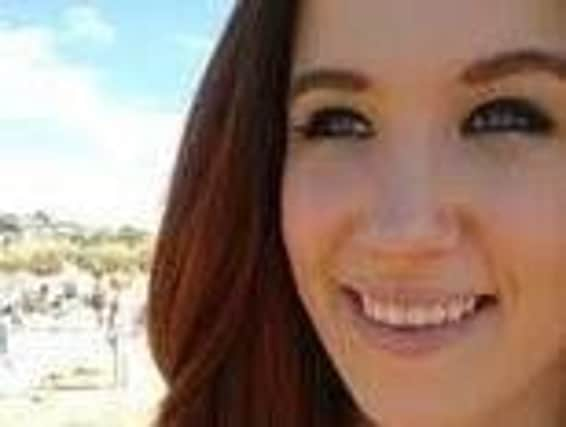Sheffield coroner calls for 'lessons to be learned' in city's mental health services after girl, 16, took her own life


At the final day of the inquest into the death of 16-year-old Daisy French, who died on April 19 this year after being hit by a train at Meadowhall Interchange, Coroner Louise Slater delivered a verdict of narrative conclusion.
Ms Slater said that while she was satisfied Daisy ’deliberately’ placed herself onto the train tracks ‘it is unclear whether she intended to take her own life at this time’.
Advertisement
Hide AdAdvertisement
Hide AdShe said this meant she could not return a verdict of suicide.
RELATED LINKS:
The court was told that Daisy’s mental health problems first came to light in January 2013 when she attempted to take an overdose, aged just 13-years-old.
Later that year, she was diagnosed with Asperger Syndrome, depression and non-organic psychosis - the latter of which was diagnosed after she told medics she had been ‘hearing voices’ and seeing things. She was also prone to self-harm, the court was told.
Advertisement
Hide AdAdvertisement
Hide AdResponsibility for Daisy's mental health care was initially under the remit of Sheffield Children's NHS Foundation Trust (SC), and was officially transferred to the early intervention team at SHSC, which deals with mental health services for adults in the city, in December 2016, Sheffield Coroners' Court heard.
Ms Slater said Daisy’s death 'highlighted a number of concerns about mental health provision for children aged between 16 and 18’ - after learning of a number of difficulties in the way the two trusts communicated with each other and in the transfer of care from one trust to the other.
She said she was going to write a letter to the two health trusts involved in providing mental health support for Daisy, SC and SHSC, as well as NHS England, calling for lessons to be learned in five separate areas of the city's mental health provision in a bid to prevent further deaths.
They are:
1, Communication and information sharing between Adult Services and Child and Adolescent Mental Health Services (CAMHS), which falls under the remit of SC
2, The out-of-hours provision for 16 to 18-year-olds.
Advertisement
Hide AdAdvertisement
Hide AdThis comes after the inquest was told that Adult Services, who would assess Daisy if she needed support out-of-hours and after she had transferred into their care, could not access the notes on Daisy held by CAMHS.
Psychiatric nurse, Helen Moore, assessed Daisy at around 7am on March 17 this year, after the teenager was admitted to hospital after making a 999 call, in which she threatening to take her own life.
She said she did not have access to Daisy's notes from CAMHS, when assessing whether she should be admitted as an in-patient at a mental health facility, and that it was something that had been an issue for the two and a half years she had worked in the role.
Ms Moore told the inquest:"I think it would have been significantly beneficial to have access to the notes. In day times it might be easier."
Advertisement
Hide AdAdvertisement
Hide AdShe said she believed CAHMS would be available to liase with between 10am and 4pm on weekdays only.
3, The transfer of care from CAHMS to adult services
Ms Slater told the court that Daisy had found the transition 'difficult'.
4, The placement of people under 18-years-old in a crisis house which is for adults
Ms Slater told the court: "Daisy found the admission to the crisis house very difficult to deal with."
Advertisement
Hide AdAdvertisement
Hide Ad5, Assessing the return of a person under the age of 18-years-old to a supported living setting following a Section 136 assessment - when someone has been detained under the mental health act - where there is no member of staff present
The court was told that Daisy was told how on on November 29, 2016 and March 15, 2017 when the teenager was found at Meadowhall and Sheffield train stations, respectively, in 'distress' and talking about wanting to end her life.
The court was told how Daisy had to be physically restrained by British Transport Police to prevent her harming herself.
After the second of the incidents, Daisy was initially detained under Section 136 of the mental health act, but after being assessed at Northern General Hospital medics deemed that she did not meet the criteria for a formal admission at a psychiatric facility. Daisy chose not to return to her mother or her father's house after the assessment was completed and so was returned to her accommodation at a women's safe house, where she was left alone due to no staff being present at the time, which was normal protocol for that time of the night.
Advertisement
Hide AdAdvertisement
Hide AdSpeaking after the inquest, Daisy's family said: "Daisy was 16 when she died. We are utterly devastated by the senseless loss; this simply should not have happened.
"Daisy was a beautiful, kind, caring and loving young woman who loved singing, music, make-up and drama. She had a great sense of humour and an unforgettable laugh."
National charity PAPYRUS (Prevention of Young Suicide UK) offers confidential help advice to young people or people worried about a young person.
The charity's HOPELineUK helpline services are staffed by mental health professionals. Call them on: 0800 068 41 41, text 07786 209 697 or email [email protected]